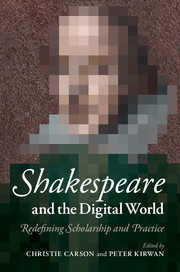Book contents
- Frontmatter
- Contents
- Notes on contributors
- Acknowledgements
- Shakespeare and the digital world
- Part I Defining current digital scholarship and practice
- Part II Defining current digital scholarship and practice
- Half-time: A pause for reflection
- Part III Redefining the boundaries and practices of Shakespeare studies online
- Part IV Redefining the boundaries and practices of Shakespeare studies online
- Index
Part II - Defining current digital scholarship and practice
Shakespeare pedagogy and the digital age
Published online by Cambridge University Press: 05 July 2014
- Frontmatter
- Contents
- Notes on contributors
- Acknowledgements
- Shakespeare and the digital world
- Part I Defining current digital scholarship and practice
- Part II Defining current digital scholarship and practice
- Half-time: A pause for reflection
- Part III Redefining the boundaries and practices of Shakespeare studies online
- Part IV Redefining the boundaries and practices of Shakespeare studies online
- Index
Summary
As Brett D. Hirsch argues in the introduction to Digital Humanities Pedagogy: Practices, Principles and Politics (2012), pedagogy has been sidelined in the ongoing studies of and reflections on shifts in the digital humanities. In the focus on open-access publishing, new research tools and scholarly networks, the danger is that teaching becomes treated as a subset of developments elsewhere, or that we risk ‘simply “digitising” existing ways of learning’ rather than advancing ‘a genuinely digital pedagogy’, in the words of David Puttnam (2012). As Hirsch argues,
[T]o bracket pedagogy in critical discussions of the digital humanities or to completely exclude it from these discussions reinforces an antagonistic distinction between teaching and research, in which the time, effort, and funding spent on the one cannibalizes the opportunities of the other.
(2012: 5)The potential tension between the two fields is heightened by the political movements driving pedagogic practice. In the UK, fee increases and growing concern for the ‘student experience’ as a Key Performance Indicator for universities inform a climate in which student evaluation of teaching environments, and students’ sense of their value for money, are increasingly important factors in institutional spending. Across the last decade, the number of digital initiatives designed to support teaching – from e-books to virtual learning environments, open-access online courses to tablet devices in the live classroom – has proliferated. Yet the speed at which new technologies are adopted does not always leave time for pedagogic reflection on how and why they are being used, and the teacher struggling to keep up may find her or himself grappling with devices with which students are much more au fait.
- Type
- Chapter
- Information
- Shakespeare and the Digital WorldRedefining Scholarship and Practice, pp. 57 - 62Publisher: Cambridge University PressPrint publication year: 2014

